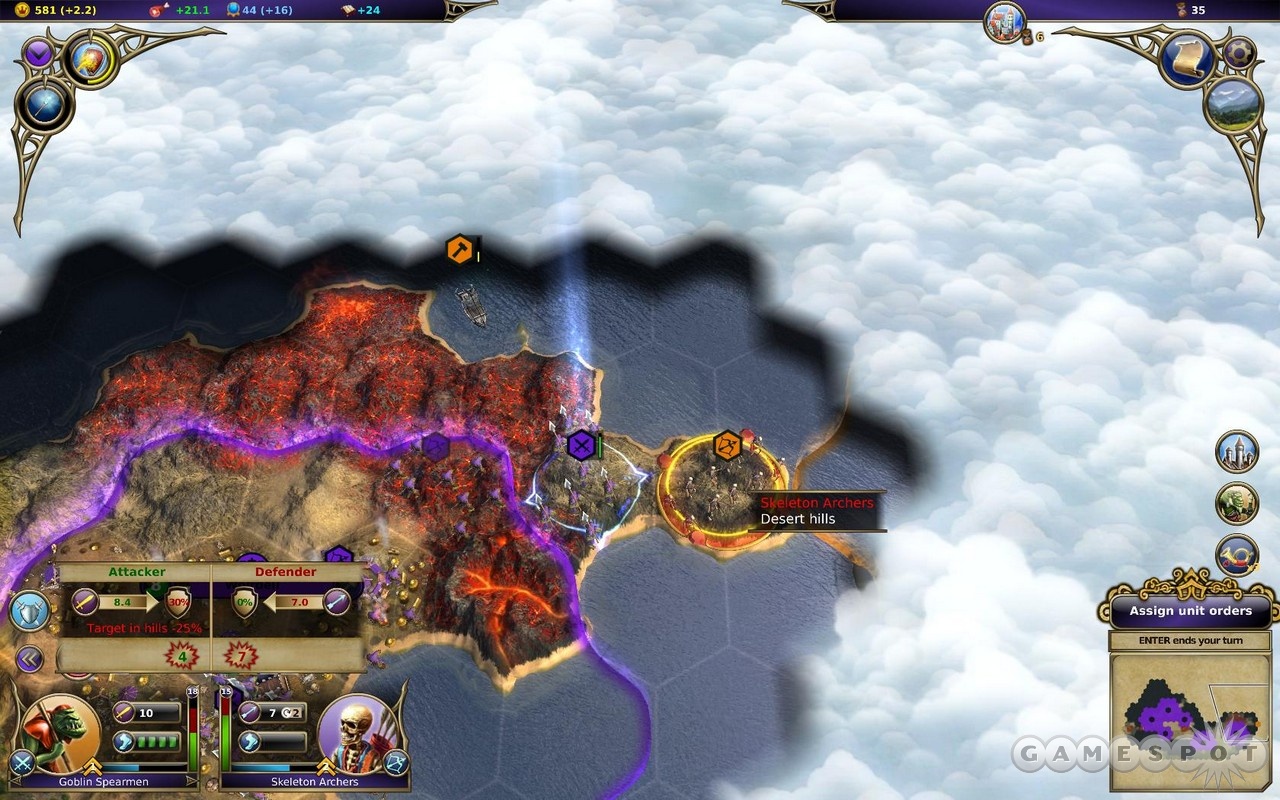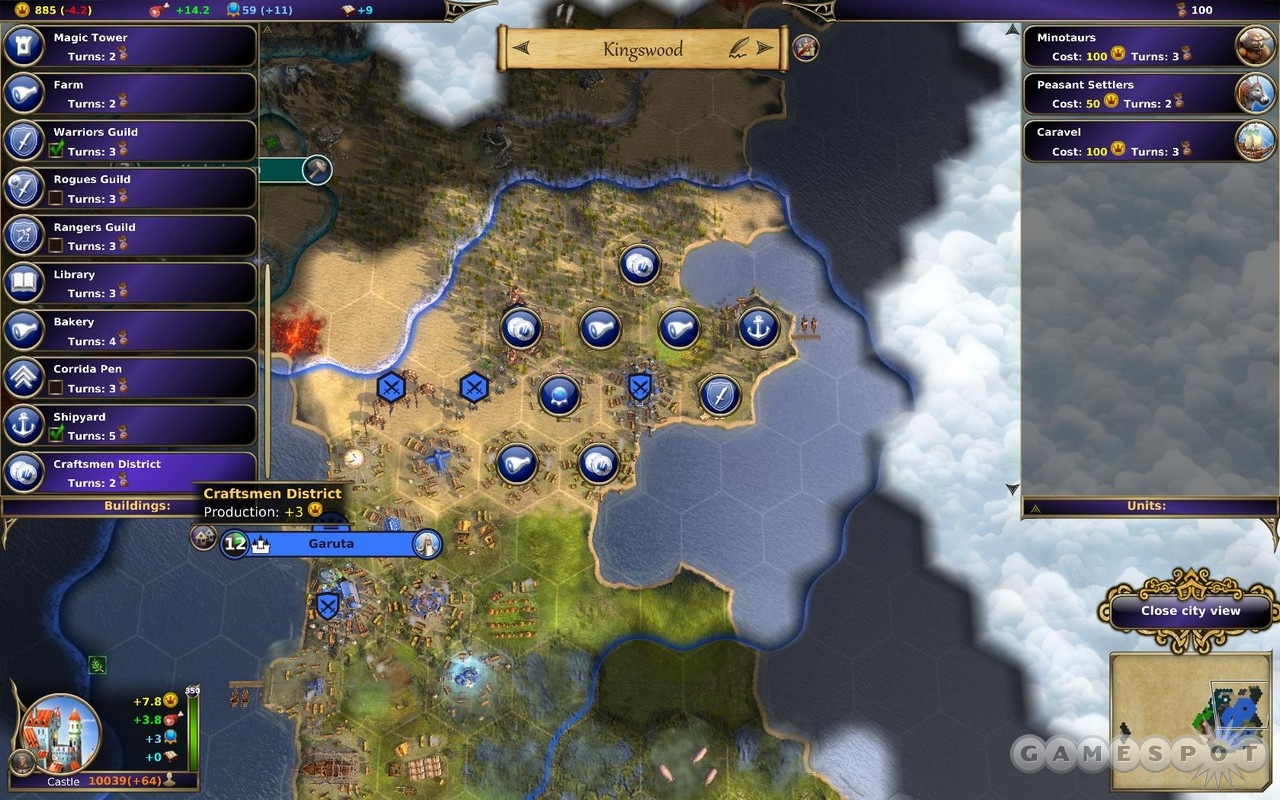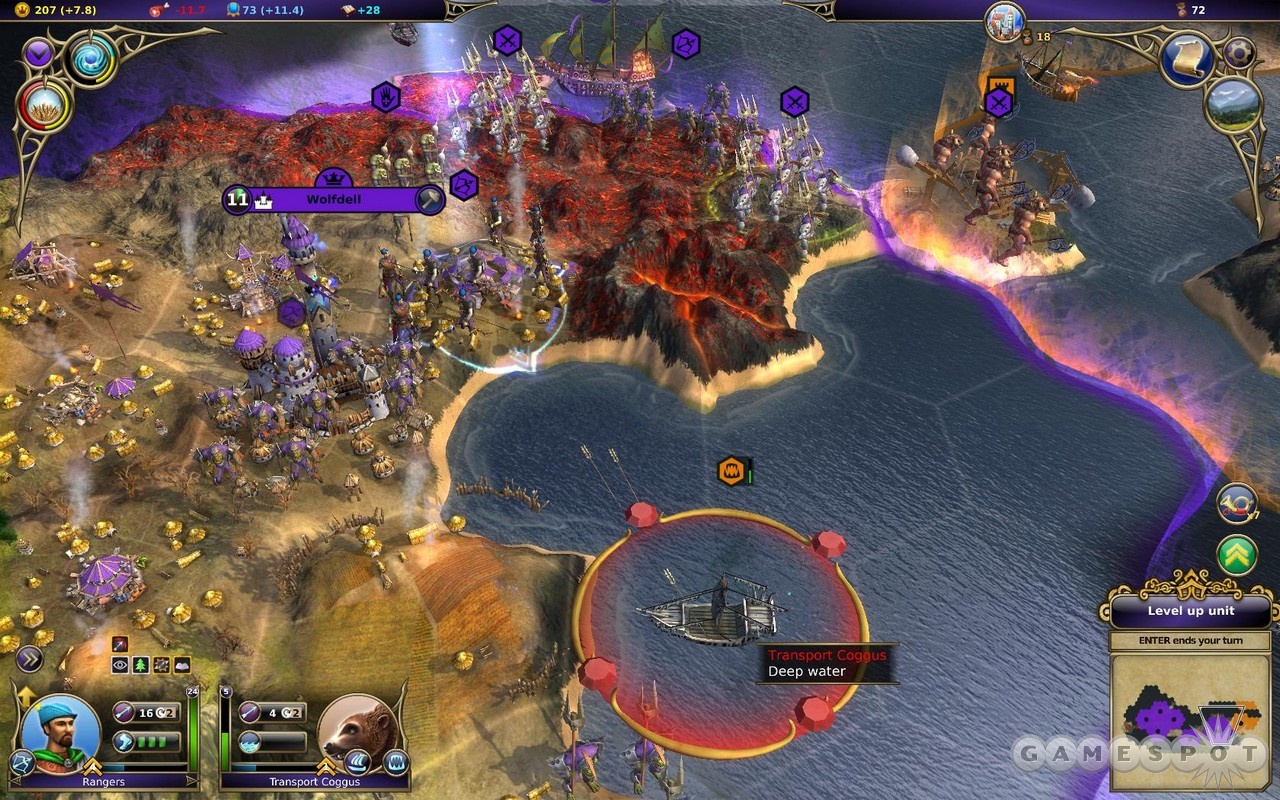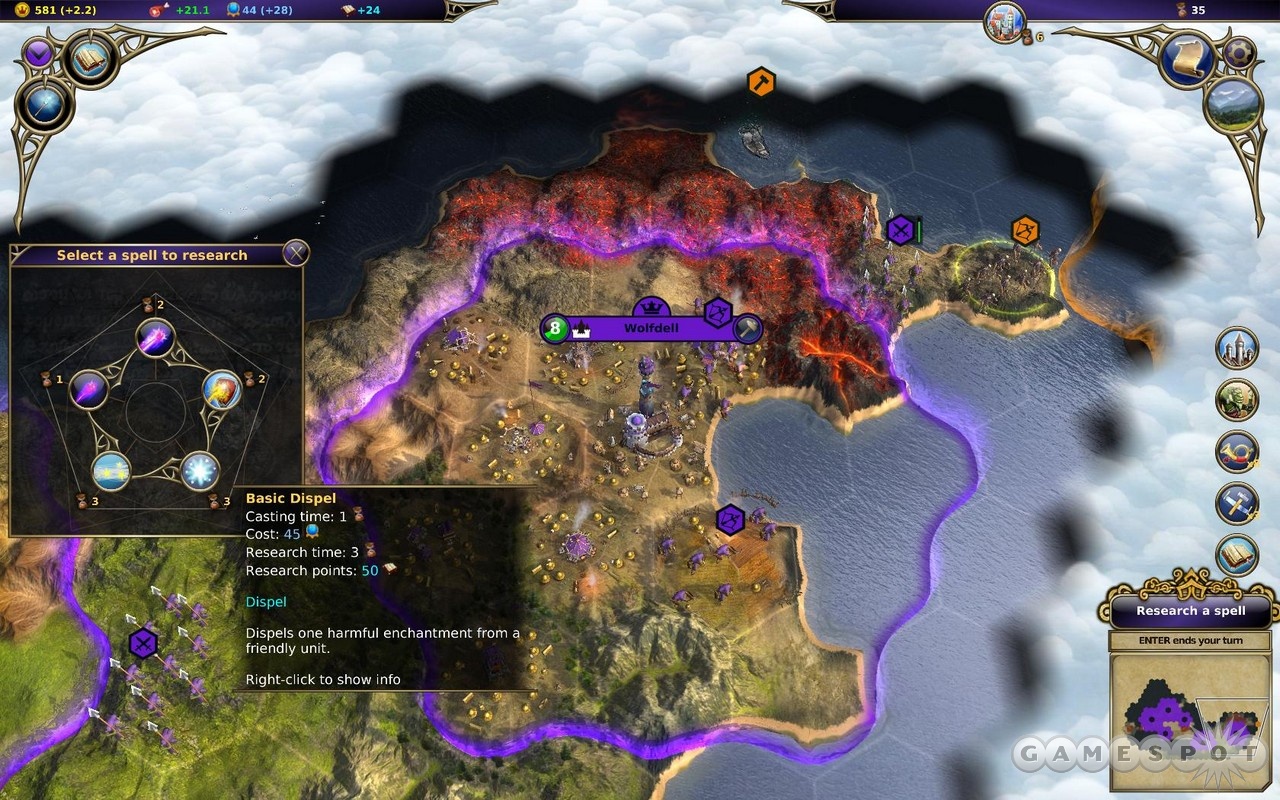War--what is it good for? In Warlock: Master of the Arcane, war is good for absolutely everything. Warlock focuses on the "exterminate" portion of the 4X (explore, expand, exploit, exterminate) strategy formula, with rudimentary diplomacy and research systems, leaving a fun and sometimes intense turn-based strategy game that's all about throwing armies of high-fantasy creatures into conflict. While the game's enemy great mages (aka the "AI") could use a better grasp of their own systems, Warlock provides a satisfying challenge, provided you play on its higher settings.

The turn-to-turn gameplay is similar to Civilization and other 4X games--you send out units across the map, build and expand cities, or fight (or all three, depending on the turn). Warlock is set in Ardania, the land of the Majesty series of fantasy sim games. Your goal is to become the strongest of the great mages and establish a mighty empire. The game has three factions: the humans, which feature units such as warriors, archers, and mages; the monsters, who have goblins, ratmen, trolls, and the donkey knights (yes, donkeys are one of Warlock's many resources); and the undead, who sport the usual assortment of skeletons, ghosts, and vampires that you'd expect--along with ghost ships like the Flying Galleus. Each turn, you decide where to explore, move units, attack, and, depending on where you are, research new spells or construct new buildings.
The game looks and plays a lot like Civilization V, with hexes, one unit per hex, similar-looking formations, and so on. But where it diverges from Civ is in management; all you need to worry about (besides the enemy and aggressive neutrals) are four resources: gold, food, mana, and research. You don't have to worry about pollution, about happiness, about diplomacy--just maintaining and providing for your army. And this makes Warlock refreshing. The game puts you into combat quickly, generally starting your first city near some sort of enemy, be it a neutral city (which can be any of the three factions) or a neutral monster generator that spews enemies on a regular basis (such as cockroaches, rats, and spiders--and even stronger creatures, like bears and ogres).
Warlock works because of balance--each faction has strengths and weaknesses. Take the undead. Their death magic makes them powerful, and their ghosts are immune to most forms of damage. But this is counterbalanced by the life magic of the human faction, which can shred through the undead. The monster faction has strong units that use spirit magic but are costly to maintain.
What's great about the faction is that while they're balanced well against one another, they each feel different. When you're playing as the monsters, your tanklike trolls feel different from the other factions' heavy melee units. The Flying Galleus of the undead is distinct from the galleon of the humans. One thing that helps make the units and factions distinct is voice-overs. A number of units speak when you click on them, and each line fits the faction. The lines of many of the monsters are funny (goblin archers sometimes screech "Best archers in the world!"), and most of this dialogue adds flavor, such as the ghostly captain voice of the Flying Galleus. It doesn't grow tiresome, even after dozens of hours of playtime.

A group of neutral units may also complement your armies. You may recruit minotaurs and halberdiers--and even dragons--by building on spaces that spawn such creatures. Spells let you summon some low-level monsters and, later, elementals. When you take over a foe's city, you can't raze it. You instead make it yours, but you keep the other faction's buildings and units (which is how you may end up with mages of the human faction backing your ghosts). You may also set up your game with portals to other worlds. These planes are stocked with powerful monsters, but if you establish a foothold, you can recruit some of the most powerful units in the game. This variety is invigorating: you may play the same faction several times in a row but wind up relying on different unit makeups.
Your units also gain access to various upgrades and perks. Combat earns experience, and when a unit reaches a new level, it receives a new perk. These can boost offense, defense, range, sight, or the rate at which you regenerate life or acquire experience. Be savvy in how you use these perks--if you choose carefully, you can develop low-level units into threats. Upgrades come from special buildings you construct on resources, such as iron and magic nodes. It costs some gold to implement an upgrade, but it's worth it; like with perks, you can buff your units in a variety of ways.
Proper tactics are especially important in the early game, when the enemy great mages (and neutrals) remain a great threat before you load up on advanced units, perks, and upgrades. Setting up your assault or defense is about more than merely supporting your ground forces with ranged units--you must take into account the enemy units strengths and weaknesses, the terrain, and how a properly used spell could affect the battle. Great mages are fond of summoning monsters, so a thin defensive line could be easily bolstered by elementals with a flash of magic. Like in Civilization V, cities can defend themselves; this is especially troublesome (or helpful, if you're on defense) when a ranged unit is in the city hex. You also need to watch out for wandering monsters; when one appears, you're never sure if it'll attack you or the enemy.

Warlock's diplomacy doesn't allow for anything more sophisticated than a peace treaty or demands for gold or mana. You might also take issue with the lack of research or victory options; you can win the game only by defeating your foes, casting the unity spell (which grants you an automatic victory), defeating a god's avatar, or claiming all of the holy grounds on a map. But Warlock wasn't designed with diplomacy or research in mind. Constructing buildings has but two goals: to sustain and to upgrade your war machine. The same goes for exploration--your recon forces fan out not to find wonders but to locate suitable resources for new cities or to look for enemies, monsters, and other neutrals to pound. Diplomacy is useful only for bullying your enemy into giving you gold or mana instead of issuing an outright declaration of war. You won't find alliances or research agreements in Warlock.
How are Warlock's great mages at warfare? They fare better on defense than offense. The enemy great mages (sadly, these aren't hero units, as in Master of Magic) that lead the opposing forces understand how to flank, and they even get some of the more advanced concepts. Playing on challenging difficulty, an enemy mage will place a unit of donkey knights among a group of resting warriors, preventing the forces from regaining health. It constructs defensive fortifications that lay down overlapping fields of fire, or it snipes at you from its borders thanks to the extended reach of the magic tower's mystic cannons.
The enemy great mages are capable of making some boneheaded decisions as well. Undead units are immune to death magic, but the AI may use an advanced unit, such as noble vampires, to blast away at lowly skeletons, who are immune to their magic-driven attacks. Or it will attack ghosts, who are immune to physical damage, with melee units. Enemy great mages tend to neglect using middle-tier and higher-tier units, favoring conjured beasts and hordes of starter units. Waves of skeletons, bats, and conjured wolves fall to a single, buffed unit. And the AI has problems discerning which of your units is the best to attack. The enemy mages don't always press their attacks, either not sending enough units or failing to isolate your forces.
Warlock doesn't make good use of water spaces; they're essentially highways for getting from one landmass to another. Sure, you may find some floating treasure or monster lairs (and monsters such as giant fish and krakens), but the only way to exploit these spaces is to build either a harbor or a fishing village. It would also be handy if the game communicated the benefits of certain spaces, such as how terrain affects combat and movement. But even the manual and beginner's guide lack this basic information.

In fact, the manner in which Warlock presents its information is its major flaw. The game and its manual lack information trees. You would think that the tax office, a building that boosts a city's gold output, would be something you would gain access to if you built other gold-producing structures. But to gain access to it, you need…a rogue's guild. The system for researching spells is even more confusing: you may select one of five options, but again, no trees exist inside the game. The logic in which the spells appear as research options is difficult to discern. You can find some of this information on Paradox Interactive's forums, but that's no substitute for proper in-game communication.
Warlock: Master of the Arcane is pretty good as it stands, though. It offers a reasonable challenge at its higher difficulties, presenting its best face--combat--almost immediately after you start the game. It's an incredible rush the first time you hold off an enemy great mage's swarm of units as it attacks one of your cities or you make your final push toward the foe's capital. There are some problems here, but Warlock feels fresh enough to keep you squashing the opposition until the wee hours of the morning.



